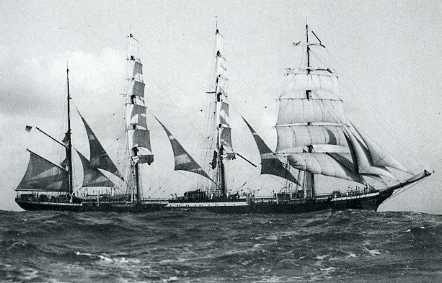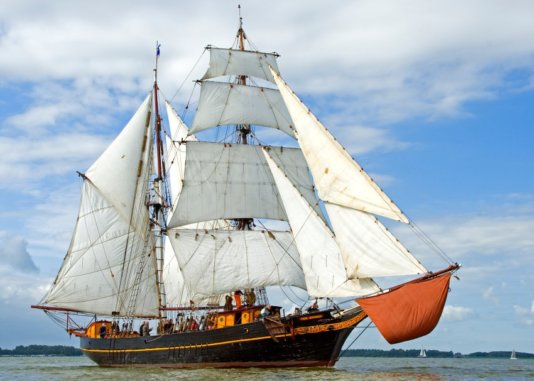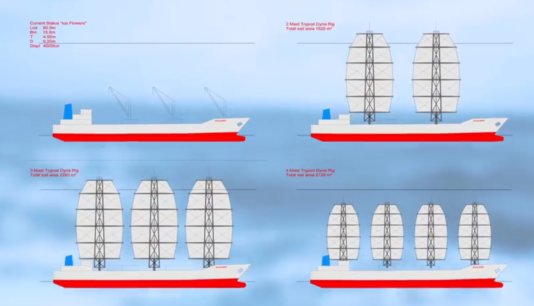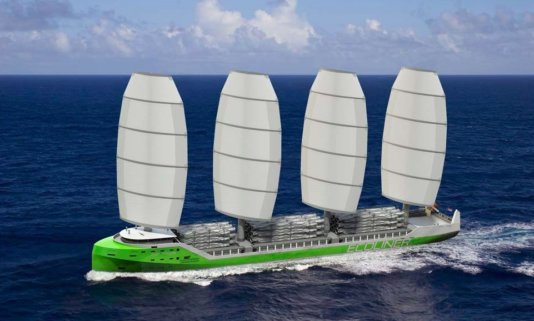- About
- Topics
- Story
- In-Depth
- Picks
- Opinion
- News
- Donate
- Signup for our newsletterOur Editors' Best Picks.Send
Read, Debate: Engage.
| July 16, 2014 | |
|---|---|
| tags: | #cargo, #CO2 emissions, #eco-friendly, #Ecoliner, #Fair Transport, #global transport, #logistics, #sailing vessel, #toxic emissions, #value chain |
| located: | USA, Netherlands |
| by: | Itai Lahat |
Are you a mindful consumer that is willing to pay for produce a bit more if it is more worker and environment friendly? Take for example the fair trade coffee you are sipping every morning. It tastes good to know that the people who produce it got their fair share of the profit. It makes it even better when you know it was organically raised, without toxins and pesticides being used in the growing process and without adding to the contamination of the wild life, people and environment. It makes it almost perfect on your tongue to be aware that this coffee was produced in a factory that uses the energy of the sun for the manufacturing process and that the packaging is fully recyclable.
Surly that is the perfect product. Surly not.
Most of your effort as a conscious consumer is gone to waste on the transport chain. Why? Because the cargo ship that brought it all the way from South America to Europe, has been omitting on the journey the amount of pollution equivalent to 50 million cars. That’s right, according to James Corbett, professor of marine policy at the University of Delaware, the 15 largest ships in the world emit as much nitrogen oxide and sulphur oxide as the world’s 760 million cars.
According to the International Maritime Organization, sea shipping accounts for around 3 to 4% of global CO2 emissions. That may not sound like a lot—and because container ships can carry so much, they’re relatively efficient on a ton per mile basis—but as shipping industry grows, so does its carbon footprint.
Unsurprisingly, such colossal ships require a staggering amount of fuel to propel them across the seas, and the fuel used is low-grade bunker fuel – also known as Heavy Fuel Oil – which contains more sulphur than traditional diesel. With consumption rising – in 2001 around 278m tones of bunker fuel was consumed, estimates suggest over 500m will be used in 2020 – changes need to be made to these huge cargo ships in order to do less damage to the environment.
So the maritime shipping industry could stand to go on a carbon diet. Some of the big players, like Denmark’s Maersk, have already made moves to improve environmental performance—its massive Triple-E container ships will be able to hold more cargo, requiring fewer trips, while its more efficient engines and waste heat recovery system could help cut the cost of long-distance transport. The company believes the Triple-E will be able to cut carbon emissions per container moved in half.
But there are more environmental friendly players in the shipping business. One of them is Dutch company Dykstra that is designing a new iteration of sail-powered ship, using old sailing knowledge and new sailing technology. The Ecoliner Fair Winds has four massive 'automatic' sails that are moved by; in addition to the wind, software and satellite-based weather data that together calculate the optimal route for the ship when it is underway.
These means Ecoliner needs very little crew to sail, and also much less fossil fuels than a regular container ship. Ecoliner can still carry dozens of regular-sized containers.
Dykstra is planning an entire armada of these wind-assisted vessels. Fair Transport, the for-profit company that partnered with Dykstra to help design the Ecoliner, is out to reduce the use of regular container ships, which contribute a billion tons of CO2 to the atmosphere annually.
Fair Transport's founders Andreas Lackner, Arjen van der Veen, and Jorne Langelaan have for four years been sailing an old brig, the Tres Hombres, to demonstrate that sustainable wind-powered shipping is possible. But the trio would also like to offer the shipping world a fleet of high-tech sailing ships that can carry dozens of industrial containers while being navigated by a slim crew, and reducing container ship pollution - in other words, be economically and environmentally sustainable. And when this becomes a reality, you will be able to enjoy your coffee much more.
By copying the embed code below, you agree to adhere to our republishing guidelines.




